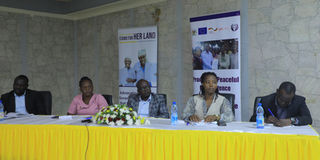Prime
Government to reduce land registration steps

Experts speaking during the dialogue yesterday. PHOTO/BUSEIN SAMILU
What you need to know:
Revealing this development, the Ministry’s Principal Land Officer, Ms. Eunice Nabakwa, stated during a roundtable dialogue on sustainable land rights registration, "The essence of all this is to reduce red tape and the costs associated to enable many people to register their land."
The Ministry of Lands, Housing and Urban Development is set to streamline the land registration process, reducing the required steps from 27 to just four. This significant reform aims to make land registration more accessible and affordable for all Ugandans.
Revealing this development, the Ministry’s Principal Land Officer, Ms Eunice Nabakwa, stated during a roundtable dialogue on sustainable land rights registration, "The essence of all this is to reduce red tape and the costs associated to enable many people to register their land."
Lands Minister Judith Nabakooba highlighted that around 70 percent of land in Uganda remains unregistered and undocumented. This lack of formal registration has led to tenure insecurity, affecting land authorization and causing poor socio-economic outcomes and underdevelopment.
Ms Nabakwa emphasized that reducing the land registration steps and lowering costs would not only increase the percentage of registered land but also address issues like illegal evictions. Uganda recognizes four land tenure systems: Mailo, Freehold, Leasehold, and Customary.
“As a government, we are currently conducting extensive sensitization campaigns, especially targeting Bibanja holders who are often victims of illegal evictions,” Ms Nabakwa added.
The dialogue, organized by the Uganda Community Based Association for Women and Children Welfare (UCOBAC) with support from the European Union and GIZ, aimed to examine barriers to sustainable land rights registration. These include knowledge and technical barriers, institutional and policy barriers, and economic and financial barriers.
UCOBAC Executive Director, Ms Frances Birungi, stressed the importance of inclusive land registration. “As a country, we have the National Development Plan aimed at driving development. Infrastructure and investment are critical, but it’s equally important that citizens can enjoy their land rights,” she said.
Ms Birungi pointed out that ongoing land registration processes are largely funded by development partners and donors such as GIZ, the World Bank, and UN Habitat. However, this funding is often time-bound, making the processes unsustainable. “We need to ensure these processes are sustained beyond donor support,” she added.
Daniel Kirumira, Team Leader at Responsible Land Policy in Uganda (RELAPU), emphasized the need for standards and institutionalization of contributory models of land registration. He also acknowledged the support of GIZ and BMZ towards land registration in Uganda.
Dr Brian Makabayi noted that conflicts between landlords and tenants are a major challenge, causing widespread chaos. The Uganda National Land Policy of 2013 highlighted several challenges limiting land rights demarcation, surveying, and mapping, including the high cost of private surveyors, lack of equipment, and a shortage of qualified personnel.
To address these challenges, the policy aims to enhance the capacity for land rights adjudication, demarcation, surveying, and mapping by reviewing and updating the legal and regulatory framework. This would allow for the use of modern technology and promote systematic demarcation as a cost-effective strategy for registering rights.
Experts at the dialogue called on the government to make land registration affordable and reduce the registration steps, ensuring the process benefits all Ugandans.




